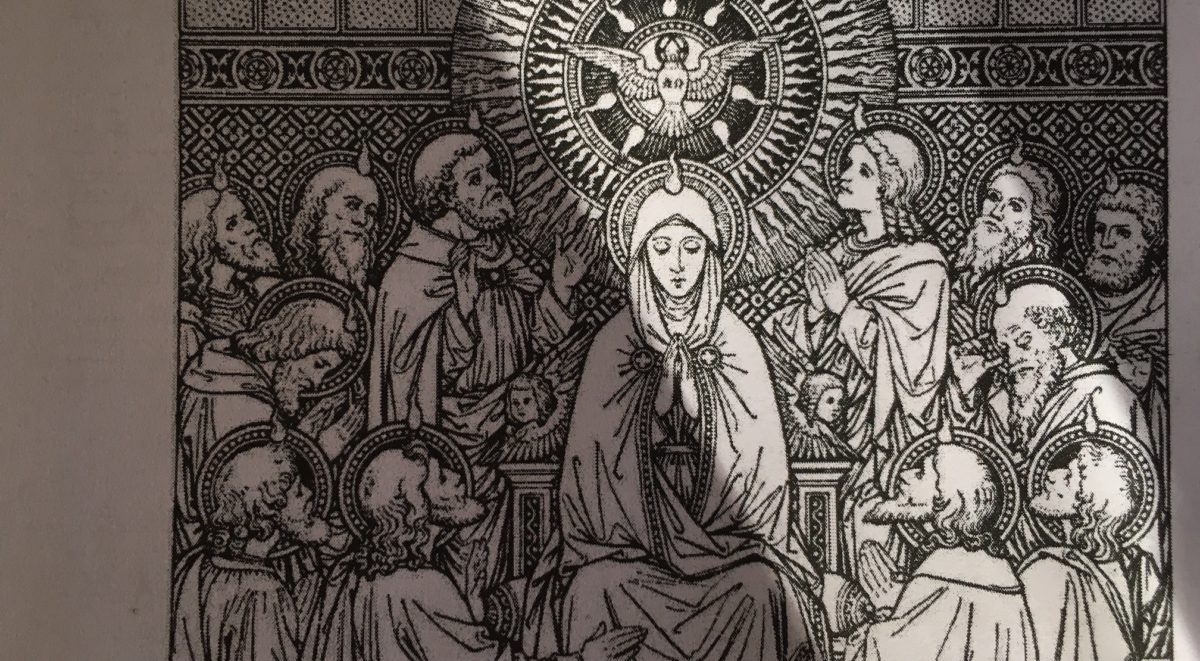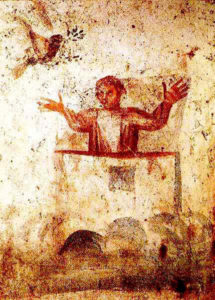
Fr Dominic considers what the Feast of Pentecost offers for the healing of our bodies, minds and spirits at this time. This meditation is based on part of Fr Dominic’s new book, How Do I Look? Theology in the Age of the Selfie, due for publication by SCM Press in the autumn.
In the present circumstances of pandemic, it’s ironic that the Biblical words for Spirit (Hebrew ruach, Greek pneuma) literally mean breath – as in the hymn, Breathe on me, breath of God. Covid-19 causes an often vicious respiratory illness, one of the symptoms of which is struggling to breathe. Fear is, of course, bad for our breathing: we tend to breathe more shallowly when we’re anxious, which makes it harder for us to expel toxins – and this puts us at more risk of falling ill. But early Christian baptism was, on a bodily level, an experience of deep breaths. The baptismal candidate was plunged into cold water. When you come out of cold water you naturally breathe in deep and sharply. So receiving in baptism the “breath”, the Spirit of God whom Jesus had breathed over his disciples (John 20.22), would have been a very physical experience. The Christian was to be a “spiritual” (pneumatikos) person, able “to discern all things”. Early Christians, as some still do today, were to pray “lifting up holy hands” (1 Tim. 2.8). Raising the hands, and arms, as we see in early Christian art, opens the chest to breathe.
 If early Christian initiation and prayer were good for the health, they also belonged to a Christian context which experienced real bodily healing: Jesus healed people, so did the first Christians (such as Peter healing Aeneas, Acts 9.32-33). “Save” and “heal” are actually the same word in the Greek of the New Testament, sozein: “Get up and go your way,” said Jesus to the leper, “your faith has saved/healed you” (Luke 17.19). (And note that “get up” is the same as “rise”, as in the Resurrection.)
If early Christian initiation and prayer were good for the health, they also belonged to a Christian context which experienced real bodily healing: Jesus healed people, so did the first Christians (such as Peter healing Aeneas, Acts 9.32-33). “Save” and “heal” are actually the same word in the Greek of the New Testament, sozein: “Get up and go your way,” said Jesus to the leper, “your faith has saved/healed you” (Luke 17.19). (And note that “get up” is the same as “rise”, as in the Resurrection.)
Since then saints have continued to heal in Jesus’ Name, by the power of the Holy Spirit. Also, whole communities and religious orders have been raised up who dedicate themselves to the care of the sick and the dying. But as the centuries have gone by, have we Christians become more anxious to avoid illness than to embrace wellness? Is our faith sometimes only a prop? Do we fear being healed (on every level) when our sickness and neurosis keep us safe?
This is not in any way to say that if you’re sick it must be your fault. Nor to deny the real apostolate of the sick and suffering. Saints like Thérèse of Lisieux and Elizabeth of the Trinity died young from illness. They, like St. Paul, and very knowingly, carried in their bodies “what is lacking in Christ’s afflictions for the sake of his body, that is the church” (Col. 1.24). In union with Jesus, they carried the sufferings of their weaker brothers and sisters. But they were not malingerers: they were fully alive. They had already died and risen in baptism, fully embraced the Resurrection, and were full of the Spirit: Thérèse and Elizabeth were already great spiritual teachers in their early twenties. St. Catherine of Siena (1347-1380) healed victims of the plague in her city, though died young of illness herself. She had long overcome any fear of death.
This doesn’t mean either that Christians don’t need medicine or should ignore true science. All truth comes from God: “the truth will set you free” (Jn. 8:32), and discerning that truth is part of living a truly “spiritual” life. So we might be surprised what medical science has actually discovered. Dr Gabor Maté, a general practitioner in a poor quarter of Vancouver, had a gift of attentive listening. Beyond the obvious discovery that illness is often caused by stress, he starting noticing correlations between types of illness and personality types. For example, he found that people with auto-immune diseases, which are difficult to treat, were often over-independent personalities, unwilling or suspicious of accepting help and love. Experience had turned them in on themselves – just as in an auto-immune disease, the immune system turns inwards and attacks the body. Maté also found that when people started to realise this, and he was able to help them have a change of heart (“repent”) and start to accept care and love, they started to heal.[i] It is simply not true that “this is just how I am”.
And if this is true even at a “secular” level, how much more true is it at a level of Christian faith, when Jesus calls us to repentance so that we can receive his healing salvation? My own experience of a complete healing from asthma has proven to me how Christ “baptises” medicine and therapy with the grace of repentance – a change of heart, an entering into the mind of God, starting to breathe with the Breath of God.
So I suggest it’s time for us Christians to rediscover Christ’s healing (with all the “dealing with one’s stuff” that that involves), and to breathe with the Spirit. St. John Henry Newman, in a meditation on the Holy Spirit, made an extraordinary prophetic statement: “By Thee we live in the atmosphere of earth, proof against its infection.”
With Christ’s love dwelling in us through the Holy Spirit, and in the maternal gaze of the Blessed Mother of God, we will live without fear. Our gaze will then be a healing gaze, our breath a healing breath. Community and the touch of love will become more real, rooted in the healing Christ and breathing the life-giving Spirit, together singing creation’s praise of God.
May the God of peace himself sanctify you entirely; and may your spirit and soul and body be kept sound and blameless at the coming of our Lord Jesus Christ (1 Thess. 5.23).
[i] Gabor Maté, When the Body Says No: The Cost of Hidden Stress, new edition, London, Vermilion, 2019.

